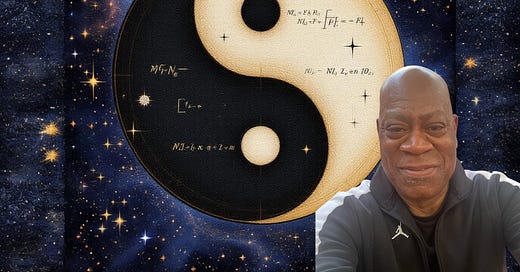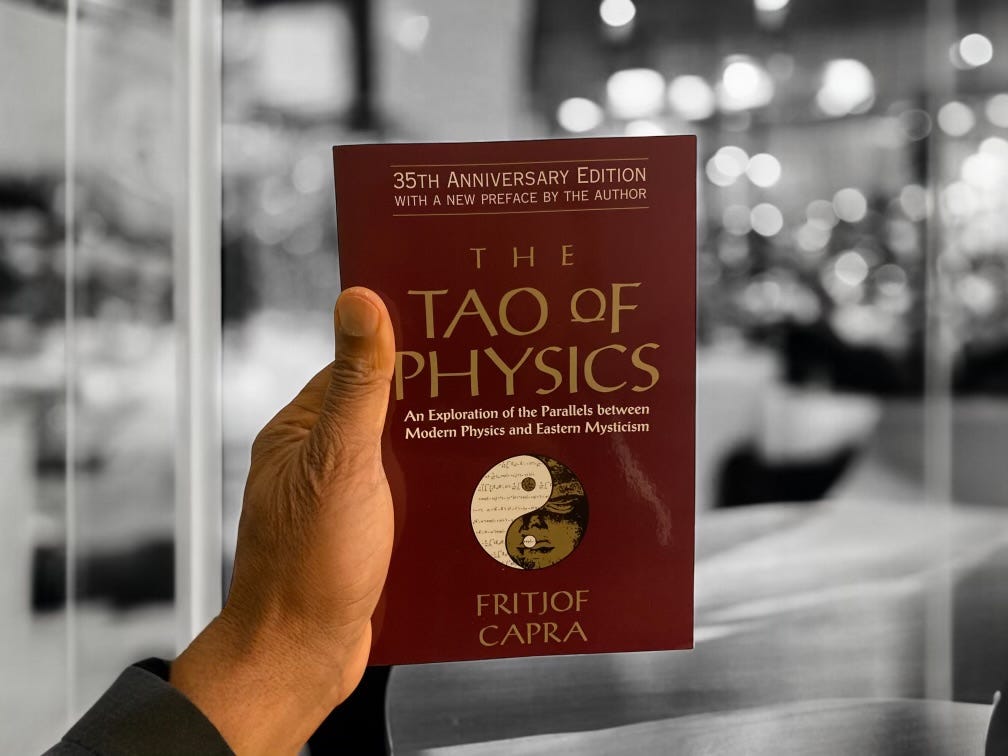Hey, if you’re digging the Daily Chocolate Taoist vibe, then consider becoming a $6.00/month or $60.00/year member supporter to help keep this full-time indie writer caffeinated and creating. And if you’re feeling a little mischievous, feel free to toss in a bit of dirty chai latte fuel into the mix. Because every sip of my favorite drink will help to keep my Taoist adventure rolling.
Let me start off by confessing something that’s been sitting in the back of my head for decades:
“Physics as a science is hard for me to make sense of. So my inclination is to avoid it.”
Recently, I was reflecting back to my sophomore year in high school when the time came to pick my high school science elective. After about twenty-three seconds of deliberation, I decided to sprint straight past physics and land safely in an earth science class.
Rocks? Sedimentary layers? Volcanoes? Sure. They made sense. They sat there quietly. They didn’t mock me with Greek letters, equations, or concepts that bent the very fabric of space and time.
Physics? Well, to me that was a whole other beast. It wasn’t just the math. Okay, maybe it was mostly about the math.
But underneath that was something more primal: I feared stepping into a world where my brain might not be enough. Where reality itself stops playing by the rules.
The Joke the Universe Played on Me
Decades later, the punchline hit me.Because whether I liked it or not, physics had been stalking me my whole life.
Every sunrise. Every gust of wind. Every breath in my qigong practice. Every wild conversation about energy, matter, and consciousness. The very Taoist philosophy that shaped my worldview was—without me fully realizing it — deeply entangled with physics.
Not the high school version I ran from.But physis — the original Greek word — meaning “the essential nature of everything.”
That’s when I stumbled into Fritjof Capra’s The Tao of Physics like a man bumping into an old nemesis in a dimly lit bar. Except this time, we didn’t fight. We talked.
Capra blew the doors wide open. His whole premise? That modern physics—especially the mind-bending realms of quantum mechanics and relativity—sounds a hell of a lot like the Tao Te Ching, the Bhagavad Gita, and the Zen koans I’d been reflecting on for years.
Suddenly, I saw it:
Physics wasn’t some sterile, lifeless system of equations.
It was poetry disguised as numbers.
It was Taoism wearing a lab coat.
The Tao and the Quantum Tango
What Capra laid out was simple and radical…..
In quantum physics, particles are waves. Waves are particles. Reality doesn’t exist in some fixed, independent state “out there.” Observation changes the outcome. Cause and effect start to wobble. Dualities dissolve.
Lao Tzu would’ve nodded:
“The Tao that can be spoken is not the eternal Tao.”
The physicist Werner Heisenberg might’ve chimed in:
“What we observe is not nature itself, but nature exposed to our method of questioning.”
Both pointing to the same cosmic mystery: You can’t pin reality down.
I had spent years absorbing Taoist wisdom, thinking it was somehow separate from the intimidating world of physics. But Capra’s book made it clear: they’re both grappling with the same slippery universe. Both trying to touch what can’t be touched. Both dancing with paradox.
What I Feared Was Never Physics
Looking back, what I was really afraid of was not failure.
It was surrender.
The surrender of my neat little view of reality.
Physics, at its core, demands that we let go of certainty. That we embrace the unknown. That we make peace with mystery. That’s the Tao.
“The more you know, the less you understand.”
In dodging physics class, I wasn’t just dodging equations. I was dodging life itself. The great unraveling of all the tidy stories we tell ourselves to feel safe.
I See It Everywhere Now
Now? I see physics everywhere.
In the rhythm of breath work. In the flow of qi through my body. In the swirling unpredictability of human connection. In the fragile balancing act of economies and ecosystems.
Physics isn’t trapped in some dusty textbook. It’s in the void and the fullness. The yin and the yang.
The Tao moving through it all.
Capra’s line still echoes in my head:
“Physicists do not need mysticism, and mystics do not need physics, but humanity needs both.”
Damn right.
I didn’t need that high school class to arrive here.
But maybe the path I took—through fear, surrender, and ultimately, wonder—was its own kind of physics lesson.
One the Tao was always waiting to teach me.






When the universe is your teacher you can’t skip class.
Going to have to pick up that book. :-)